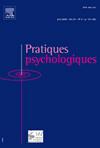Identifier le contrôle coercitif et les conséquences psychosomatiques dans les violences conjugales : une analyse qualitative du vécu de quatre femmes suivies dans une unité de prise en charge du psychotraumatisme
IF 0.3
4区 心理学
Q4 PSYCHOLOGY
引用次数: 0
Abstract
Introduction
Coercive control refers to a set of behaviors used by an individual to dominate, intimidate, or manipulate another person through various methods such as isolation, threats, surveillance, and deprivation of needs. This complex phenomenon, popularized by Stark (2007), has been the subject of studies for several decades (Dutton et Goodman, 2005; French et al., 1959; Okun, 1986). If coercive control is not detected or if it is identified too late, the insufficiently protected victim will then suffer physical and psychological health consequences. The repetition and cumulative effect of violence worsen over time, hindering victims in the judicial processing of the violence they have experienced.
Objective
This study aims to provide a clinical illustration of coercive control and its somatopsychic consequences in women victims of intimate partner violence perpetrated by their partner. We conducted a qualitative analysis of clinical interviews from four psychological follow-ups representing women victims of intimate partner violence followed within a psycho-trauma unit in the Île-de-France region.
Results
The synthetic restitution of the clinical vignettes presented highlights the establishment of coercive control early in the relationship between the perpetrator and the victim, with a range of behaviors triggering early micro-management of verbal and psychological violence, establishing a continuum from the beginning and evolving throughout the relationship, including after separation.
Conclusion
Training professionals in identifying mechanisms of coercive control could enable early systematic screening in the medical-psycho-social-judicial sector and propose concrete preventive actions against intimate partner violence and femicides. It could also facilitate the dissemination in France of a coercive control screening scale, as suggested by the team (Wilson, 2022; Wilson et Fritz, 2023) in their work with which we wish to collaborate in France.
确定家庭暴力中的强制控制和身心后果:对四名妇女在创伤护理单位的经历进行定性分析
强制控制是指一个人通过隔离、威胁、监视和剥夺需求等各种方法来支配、恐吓或操纵另一个人的一系列行为。Stark(2007)推广了这种复杂的现象,几十年来一直是研究的主题(Dutton et Goodman, 2005;French et al., 1959;奥肯,1986)。如果没有发现强制控制或发现得太晚,那么没有得到充分保护的受害者将遭受身心健康后果。暴力的重复和累积影响随着时间的推移而恶化,妨碍了受害者对其所经历的暴力进行司法处理。目的本研究旨在为女性亲密伴侣暴力受害者的强制控制及其躯体心理后果提供临床例证。我们对在Île-de-France地区的一个心理创伤单位中代表亲密伴侣暴力的妇女受害者的四个心理随访者的临床访谈进行了定性分析。结果对临床小插曲的综合还原强调了在加害者和受害者之间的关系早期建立强制控制,一系列行为引发了早期的语言和心理暴力的微观管理,从一开始就建立了一个连续体,并在整个关系中发展,包括分离后。结论对专业人员进行强制性控制识别机制的培训,可以在医疗-心理-社会-司法部门进行早期系统筛查,并针对亲密伴侣暴力和杀害妇女提出具体的预防措施。正如该团队所建议的那样,它还可以促进在法国传播强制控制筛查量表(Wilson, 2022;Wilson et Fritz, 2023)在他们的工作中,我们希望在法国合作。
本文章由计算机程序翻译,如有差异,请以英文原文为准。
求助全文
约1分钟内获得全文
求助全文
来源期刊

Pratiques Psychologiques
PSYCHOLOGY-
CiteScore
1.40
自引率
0.00%
发文量
19
审稿时长
81 days
期刊介绍:
Pratiques psychologiques is an official publication of the ''Société française de psychologie''.
It publishes thematic issues, and concentrates on the applications in the psychological practice. It covers all fields of psychology.
 求助内容:
求助内容: 应助结果提醒方式:
应助结果提醒方式:


